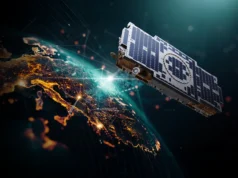BAE Systems has announced the successful completion and shipment of the Wide Field Instrument (WFI) for NASA’s upcoming ‘Roman Space Telescope’, to the Goddard Space Flight Center in Greenbelt, Maryland.
According to a recent press release from the company, the delivery marks the end of a rigorous integration and testing process for the advanced scientific instrument, which is set to play a pretty big role in NASA’s next flagship astrophysics mission.
The WFI, which will serve as the primary scientific instrument for the Roman Space Telescope, is an advanced imager capable of capturing visible-to-near-infrared images with additional spectral capabilities.
The instrument promises to revolutionise astronomical surveys by offering a field of view at least 100 times greater than that of its predecessor, the Hubble Space Telescope, all while maintaining similar resolution.
This expanded capability is expected to accelerate the study of dark matter, dark energy, distant galaxies, and exoplanets, and provide new insights into the formation of the universe over billions of years.
BAE Systems was responsible for designing and building the WFI’s opto-mechanical assembly, which includes several critical components such as the optical bench, element wheel, thermal control system, and alignment compensation mechanism. The company also led the integration and environmental testing of the WFI to ensure it can withstand the challenges of space travel.
“The Wide Field Instrument is one of the most sophisticated instruments ever constructed, and once it’s on orbit it will provide the scientific community with the most comprehensive surveys of the sky we’ve ever captured,” said Bonnie Patterson, senior director of civil space programs for BAE Systems Space & Mission Systems, in the press release.
“Our team is proud to support such an ambitious mission, and we look forward to seeing what amazing discoveries this instrument will help to make throughout the universe.”
With the WFI now in NASA’s hands, the Goddard team will focus on integrating it into the instrument carrier and later mating it to the spacecraft bus. The Roman Space Telescope is slated for launch by May 2027.










